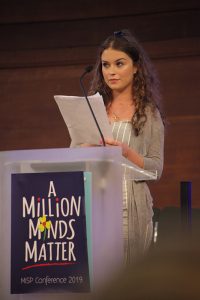
Guest blog by Emily Brierley, Youth Ambassador for Mindfulness in Schools Project
Mindfulness: a word often invoking raised eyebrows and a dismissive comment. It appears to exist on a spectrum of simply being a fad or the foundations of out of touch hippies. In reality, mindful qualities are inherent in human nature, most consistently and naturally seen in the curiosity of small children.
We are born with a sense of wonder at the smallest of phenomenon, a blade of grass, or an unfamiliar noise. Children see magic in the everyday, demand only what they need, and express their emotions without inhibition. This is part of mindfulness and we are born an expression of it.
What I feel is the essence of mindfulness.
So, what happened? Where does society rush in and extinguish these natural qualities? Should we blame the magazines, the trauma, our parents? The ‘answers’ to these questions can be found in thousands of costly self-help courses, but I believe we are the only ones who can re-ignite what was extinguished. This is the essence of what mindfulness means to me, it is a coming home to the children we were. To the core of who we still are if we only pause long enough to welcome it back.
Teaching mindfulness to the young people of today, just might mean that the adults of tomorrow don’t have to work so hard to find themselves. Mindfulness really can be two things. A lens through which to see the world in all of its magical glory, allowing for more joy and self-awareness. And just as importantly, a lifeline for when the world knocks you off your feet and you’re not sure how to get up. My experience of mindfulness has confirmed this time and again.
What has mindfulness done for me?
My journey began at the age of twelve, experiencing debilitating anxiety causing physical pain. I found and explored mindfulness. I saw my anxiety completely dissipate within three months, so I kept going. Not only was I not anxious, but my nervous system was relaxed and as a thirteen-year-old should, I saw the world as a beautiful place. Fast forward two years and I’m fifteen, running for my life away from an exploded bomb at the Manchester Arena. Maybe the world isn’t really safe. But a whole community coming together taught me yes, there is safety in love and belonging. Mindfulness led me to help young people, victims of terrorism, and even war veterans. It taught me that by healing others, we heal ourselves. But life wasn’t done. I was presented with multiple opportunities to rise up and every step of the way, mindfulness said, ‘remember who you are’. Three years later and I’m twenty-two. Happier than I have ever been, with a certainty that the world is a beautiful place. Where would I be without mindfulness? Look around you, and you’ll find too many examples.
So, where next?
I would argue that mindfulness needs to be regarded as equally essential as a GCSE in Maths and English, seriously taught in schools right from the start. There is no such thing as a mindful future if we don’t begin to build one now. Mindfulness needs to be a movement, not a moment (although that’s all it takes).
About Emily Brierley
Emily has been a Youth Ambassador for MiSP since she spoke at our 2019 Conference. Representing the Youth Voice, Emily supports MiSP to ensure that our work reflects the needs of young people today.